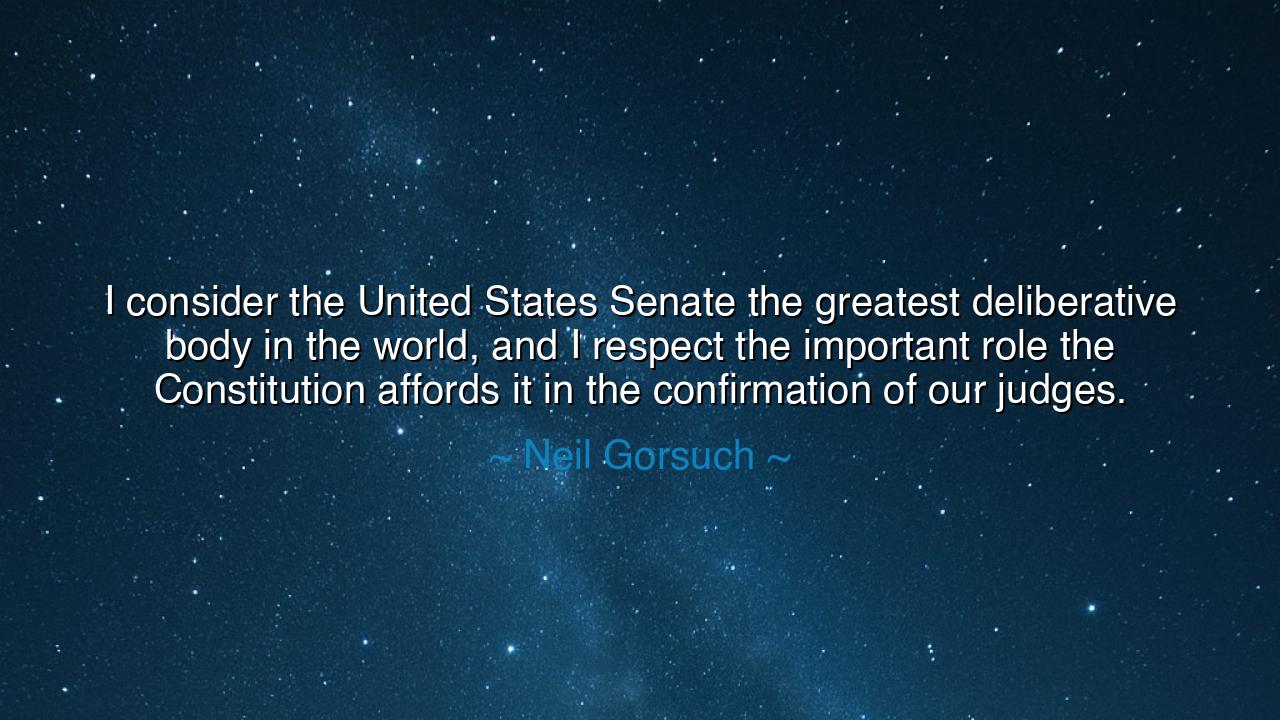
I consider the United States Senate the greatest deliberative
I consider the United States Senate the greatest deliberative body in the world, and I respect the important role the Constitution affords it in the confirmation of our judges.






The words of Neil Gorsuch—“I consider the United States Senate the greatest deliberative body in the world, and I respect the important role the Constitution affords it in the confirmation of our judges”—carry the dignity of both humility and reverence for the ancient craft of governance. In these lines, Gorsuch does not merely speak as a judge or scholar; he speaks as one who recognizes that power must be tempered by process, and that freedom itself is safeguarded not by force, but by respect for institutions. His words remind us that democracy is not born from passion alone, but from discipline—the willingness to listen, to reason, and to restrain.
To understand the weight of this quote, we must first remember the place of the United States Senate within the architecture of the Republic. The Founders, in their wisdom, designed it to be the chamber of reflection—the elder sibling to the House, whose duty was not haste, but deliberation. It was there that arguments would be tested as iron sharpens iron, where passions cooled into principle, and where the fate of laws and judges would be decided not by the mob, but by measured debate. Gorsuch’s reverence for this body arises from this noble tradition: that within its walls, the voice of reason might prevail over the noise of ambition.
The Constitution itself grants the Senate a sacred responsibility—to advise and consent on the appointment of judges. This duty is not ceremonial, but foundational. It ensures that no man or woman ascends to the bench through unchecked power or fleeting favor. The framers knew that justice, to endure, must be independent—but that independence must first be tested. Thus, the Senate’s confirmation process stands as a solemn ritual, a reminder that the law belongs to no single person, but to the people and their chosen representatives. Gorsuch’s respect for this process is a testament to his understanding of democracy not as convenience, but as covenant.
History itself provides proof of how vital this balance has been. When George Washington first sent nominees to the Senate, some were rejected—not because they were enemies, but because the Senate understood its duty to safeguard the Republic from haste and favoritism. Centuries later, in times of turmoil—during wars, divisions, and moral reckonings—the Senate continued to deliberate over judges and laws with care. It was there, during the confirmation hearings of towering figures like Thurgood Marshall and Ruth Bader Ginsburg, that the principles of liberty, equality, and conscience were weighed with solemn respect. Through such trials, the Senate affirmed not merely judges, but the moral spine of the nation.
Gorsuch’s words also reveal a profound humility before the Constitution. Though himself a jurist of high standing, he acknowledges that his power is derived from a process larger than any one individual. He knows, as the ancients did, that no one may sit in judgment without first being judged by others. This is not weakness—it is accountability, the cornerstone of liberty. The judge who respects the scrutiny of the Senate shows that he understands the sacred chain of trust linking law, governance, and the people. In an age where many seek to bypass deliberation for speed, Gorsuch’s statement stands as a defense of patience and principle.
In the spirit of the ancients, we may compare the Senate to the Athenian Council of Elders, where wisdom, not popularity, guided the fate of the city. There, as in Washington, the true art of leadership was measured not by who could shout the loudest, but by who could listen the longest. The Senate, like that ancient council, is most noble when it acts not as an arena of partisanship, but as a temple of reason. Gorsuch’s respect for it is a call to return to that ideal—to restore the lost art of deliberation, where conviction and courtesy coexist, and where truth is forged in the fire of respectful debate.
The lesson of his words is one of reverence—for process, for order, and for the fragile architecture of democracy itself. In a time when speed is mistaken for strength and outrage for righteousness, Gorsuch reminds us that true respect is shown through restraint. He teaches that every citizen, not just senators or judges, must honor the structures that protect their liberty. To respect the process is to respect the people, for the Constitution is not a relic—it is the living heartbeat of freedom.
So, my child, remember this: respect is not passive. It is active, vigilant, and disciplined. Whether in governance or in life, you must listen before you decide, question before you judge, and honor before you act. When you respect the laws that bind you, you also strengthen the freedom that defines you. Let Gorsuch’s words remind you that greatness does not come from dominance, but from deliberation—from the courage to uphold truth even when it moves slowly, and the wisdom to know that in the measured rhythm of justice lies the endurance of civilization itself.






AAdministratorAdministrator
Welcome, honored guests. Please leave a comment, we will respond soon